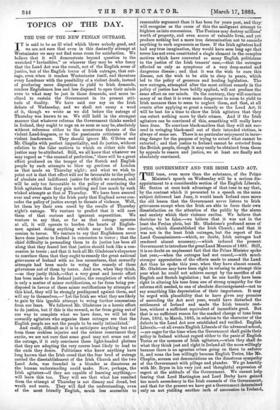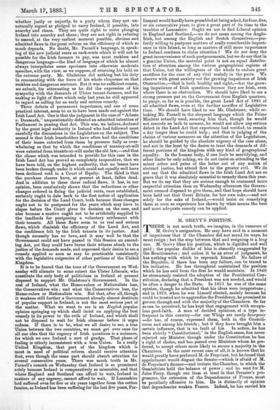THE GOVERNMENT AND THE IRISH LAND ACT.
THE tone, even more than the substance, of the Prime- Minister's speech on Wednesday will be a serious dis- appointment to a considerable section of the English Liberals.. Mr. Sexton at once took advantage of that tone to say that, by the contrast which it presented to a speech on the same subject delivered last June, it would teach Ireland once more the old lesson that the Government never listens to Irish grievances except when the Irish are able to force their own dissatisfaction on the attention of the public by the alarm- and anxiety which their violence excites. We believe that doctrine to be false,—we believe that it was not in the the Fenian plots, but Mr. Gladstone's profound sense of justice, which disestablished the Irish Church ; and that it was not in the least Irish outrages, but the report of the- Land Commissioners—which, no doubt, Irish outrages had rendered almost necessary,—which induced the present Government to introduce the great Land Measure of 1881. Still,. it is no doubt an unpleasant fact that the Prime Minister spoke. last year,—when the outrages had not ceased,—with much, stronger appreciation of the efforts made to amend the Land. Act than he spoke this year, when they have almost ceased.. Mr. Gladstone may have been right in refusing to attempt thie year what he could not achieve except by the sacrifice of all English and Scotch legislation ; but he can hardly have been, right in altering his tone from one of strong sympathy for the reforms still needed, to one of absolute discouragement—not to say something like depreciation of their importance. It may be urged with plausibility that to have given any promise of amending the Act next year, would have disturbed the settlement of Ireland and made the Irish tenants rest- less, without a sufficient equivalent of immediate good. But that is no sufficient reason for the marked change of tone from June, 1882, to March, 1883, in relation to the character of the defects in the Land Act now established and verified. English Liberals,—at all events English Liberals of the advanced school, —are eager for the time when the Government shall guide their policy in Ireland without regard either to the panic of English Tories or the menaces of Irish agitators,—when they shall do what they think just and right in Ireland all the more willingly because there is no agrarian crime going on there to enforce it, and none the less willingly because English Tories, like Mr. Chaplin, scream out denunciations on the disastrous sympathy of the Government with pillage and plunder. We go heartily with Mr. Bryce in his very just and thoughtful expression of regret at the attitude of the Government. We cannot help fearing that Lord Hartington and Lord Derby have gained too much ascendency in the Irish counsels of the Government, and that for the present we have got a Government determined only on not yielding another inch of concession in Ireland,
whether justly or unjustly, to a party whom they not un- naturally regard as pledged to carry Ireland, if possible, into anarchy and chaos. They are quite right to resist plunging Ireland into anarchy and chaos ; they are not right in refusing to amend, at the very earliest moment possible, obvious and admitted flaws in the great reform on the efficiency of which so much depends. No doubt, Mr. Parnell's language, in speak- ing of the new judicial rents as rack-rents which it will not be possible for the Irish farmers to pay, was most reckless and dangerous language—the kind of language of which he almost always interpolates some specimen into otherwise moderate speeches, with the view, as we suppose, of retaining his hold on the extreme party. Mr. Gladstone did nothing but his duty in commenting with the force of his whole eloquence on that reckless and dangerous sentence. But it was no sufficient reason, we submit, for attenuating as he did the expression of his sympathy with the demands of Ulster tenant-farmers, and for making so light of flaws which only last year. he still appeared to regard as calling for an early and serious remedy. Three defects of permanent importance, and one of some practical interest, seem to us to have been made out against the Irish Land Act. One is that the judgment in the case of "Adams v. Dunaeath," unquestionably defeated an admitted intention of Parliament in passing that Act. This was, we believe, declared by the great legal authority in Ireland who had followed most carefully the discussions in the Legislature on the subject. The second is that Irish leaseholders have often had the conditions of their leases extorted from them by pressure fully as over- whelming as that by which the conditions of tenancy-at-will were extorted from tenants-at-will under the old law,—and that the clause which was intended to provide for this case in the Irish Land Act has proved so completely inoperative, that we have been told, on the highest authority, that no leases have been broken through under it which could not equally well have been declared void in a Court of Equity. The third is that the purchase clauses have, at present at least, fallen dead. And in addition to these three radical flaws, it has, in our opinion, been conclusively shown that the reductions or other changes ordered in fixing the judicial rents, once established, certainly ought to date back to the first notice of application for the decision of the Land Court, both because those changes ought not to be postponed for the years which may have to elapse before the Court gives its decision on the case, and also because a motive ought not to be artificially supplied to the landlords for postponing a voluntary settlement with their tenants. All these flaws seem to us real and serious flaws, which diminish the efficiency of the Land Act, and the confidence felt by the Irish tenants in its justice. And though necessity has no laws, and it may well be that the Government could not have passed in this Session an amend- ing Act, yet they could have borne their witness afresh to the justice of the demands made, and expressed their desire to see a remedy applied so soon as may be practicable consistently with the legislative exigencies of other portions of the United Kingdom.
It is to be feared that the tone of the Government on Wed- nesday will alienate to some extent the Ulster Liberals, who constitute the only body of politicians in Ireland at present
disposed to support Mr. Gladstone's Government. In the rest of Ireland, what the Home-rulers or Nationalists lose, the Conservatives win ; and what the Conservatives lose, the Home-rulers or Nationalists win. But that, after all, though it weakens still further a Government already almost destitute of popular support in Ireland, is not the most serious part of the matter. What we want to see is an English popular opinion springing up which shall insist on applying the best remedy in its power to the evils of Ireland, and which shall not be disposed to wait for Irish clamour before it urges redress. If there is to be, what we all desire to see, a true Union between the two countries, we must get over once for all our idea that the urgency of Irish questions is a nuisance, for which we owe Ireland a sort of grudge. That phase of feeling is utterly inconsistent with a true Union. In a really United Kingdom, that part of the kingdom which is most in need of political reform should receive attention first, even though the same part should absorb attention for several consecutive years. There was much truth in Mr.
Parnell's remark on Wednesday that Ireland is so prominent solely because Ireland is comparatively so miserable, and that where England and Scotland can afford to wait, Ireland in matters of any urgency, cannot afford to wait. If Lancashire had suffered even for five or six years together from the cotton famine, as Ireland has been suffering for the last five years, Par-
liament would hardly have grumbled at being asked, for four, five, or six consecutive years, to give a great part of its time to the troubles of Lancashire. Ought we not to find Liberal opinion in England and Scotland,—we do not mean among the Anglo- Irish, but among the English and Scotch themselves,—per- fectly willing to postpone matters of really considerable import- ance to this Island, so long as matters of still more importance to Ireland continue to claim attention ? We do not deny the great inconvenience of such postponements, but we do say that in a genuine Union, the material point is not an equal distribu- tion of attention among the various geographical regions of that Union, but the willingness of the whole to endure great sacrifices for the cure of any vital malady in the parts. We observe with great anxiety not the growing impatience of Irish Obstruction,—that is both healthy and right,—but the grow- ing impatience of Irish questions because they are Irish, even where there is no obstruction. We should have liked to see a strong pressure put on the Government from English quarters, to purge, so far as is possible, the great Land Act of 1881 of all admitted flaws, even at the further sacrifice of Legislative time. We should have liked to see Mr. Gladstone, while re- buking Mr. Parnell in the eloquent language which the Prime Minister actually used, assuring him that, though he would not concede an inch to menace, he would not allow any serious defect in the Land Act that experience had verified, to remain a day longer than he could help ; and that in judging of the claims of various measures on the attention of the Legislature, he should be guided by the absolute urgency of the case alone, and not in the least by the desire to treat the demands of dif- ferent portions of the kingdom with any kind of geographical equality. In the human body, if one limb be mortifying, and other limbs be only aching, we do not insist on attending to the minor aches and pains of the latter out of any notion of abstract justice, but attend first to the greater evil. We do not say that the admitted flaws in the Irish Land Act are so grave that it was absolutely essential to remedy them this year. But we do say that they are serious enough to command more respectful attention than on Wednesday afternoon the Govern- ment seemed disposed to give them, and that hope should have been held out that Great Britain, for her own sake,—and not solely for the sake of Ireland,—would insist on remedying them so soon as experience has shown by what means the best and most adequate remedy can be applied.



































 Previous page
Previous page